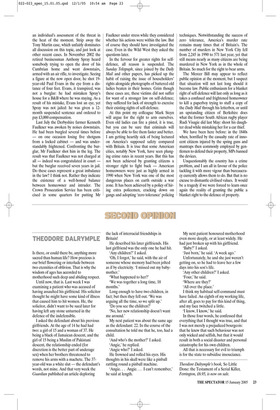SECOND OPINION
THEODORE DALRYMPLE
Is there, or could there be, anything more sacred than human life? How precious is our brief flowering or interlude between two eternities of oblivion. That is why the wisdom of ages has accorded to motherhood such deep and abiding respect.
Until now, that is. Last week I was examining a patient who was accused of having assaulted his girlfriend. His solicitor thought he might have some kind of illness that caused him to hit women. He, the solicitor, didn’t want to be sued later for having left any stone unturned in the defence of the indefensible.
I asked the defendant about his previous girlfriends. At the age of 14 he had had two: a girl of 15 and a woman of 37. He being a black of Jamaican descent, and the girl of 15 being a Muslim of Pakistani descent, the relationship ended (for discretion is the better part of underage sex) when her brothers threatened to remove his arms with a machete. The 37year-old was a white slut — the defendant’s words, not mine. And that very week the Guardian published an article deploring the lack of interracial friendships in Britain!
He described his later girlfriends. His last girlfriend was the only one he had hit. ‘Any children?’ I asked.
‘Oh, I forgot,’ he said, with the air of someone whose memory had been jolted as if by electricity. ‘I missed out my babymother.’ ‘What happened to her?’ ‘We was together a long time, 18 months.’ Long enough to have two children, in fact; but then they fell out. ‘We was arguing all the time, so we split up.’ ‘Do you see the children?’ ‘No, her new relationship doesn’t want me around.’ My next patient was about the same age as the defendant: 22. In the course of the consultation he told me that he, too, had a child.
‘And who’s the mother?’ I asked. ‘Angie,’ he replied.
‘Angie who?’ I asked.
He frowned and rolled his eyes. His thoughts in his skull were like a pinball rattling round a pinball machine.
‘Angie... Angie... I can’t remember,’ he said at length. My next patient honoured motherhood even more deeply, or at least widely. He had just broken up with his girlfriend.
‘Baby?’ I asked.
‘Just born,’ he said. ‘A week ago.’ Unfortunately, he and she just weren’t getting on, so he had to leave her a few days into his son’s life.
‘Any other children?’ I asked.
‘Four,’ he said.
‘Where are they?’ ‘All over the place.’ I think my habitual self-command must have failed. An eighth of my working life, after all, goes to pay for this kind of thing, and my face twitched a little.
‘I know, I know,’ he said.
In those four words, he confessed that everything that I thought was true, and that I was not merely a prejudiced bourgeois: that he knew that such behaviour was not only wicked and selfish, but that it would result in both a social disaster and personal catastrophe for his own children.
All that is necessary for evil to triumph is for the state to subsidise insouciance.





















































 Previous page
Previous page